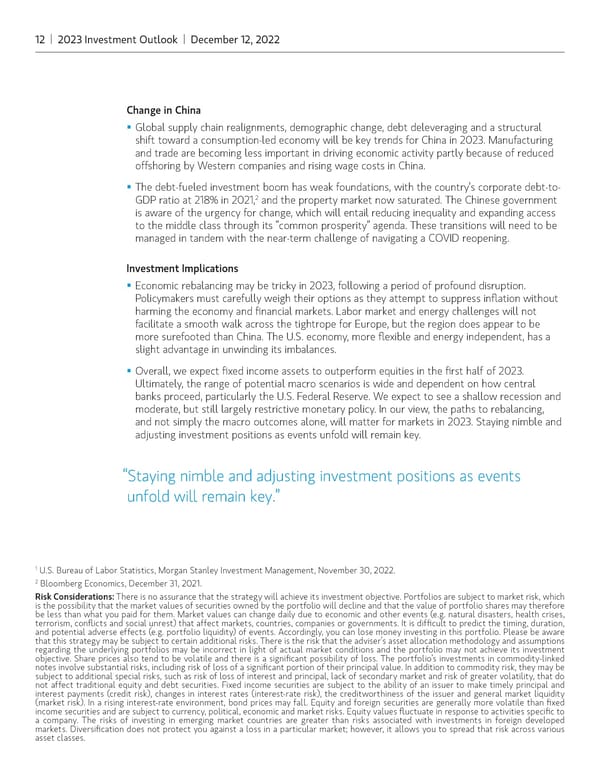12 | 2023 Investment Outlook | December 12, 2022 Change in China ƒ Global supply chain realignments, demographic change, debt deleveraging and a structural shift toward a consumption-led economy will be key trends for China in 2023. Manufacturing and trade are becoming less important in driving economic activity partly because of reduced offshoring by Western companies and rising wage costs in China. ƒ The debt-fueled investment boom has weak foundations, with the country’s corporate debt-to- 2 GDP ratio at 218% in 2021, and the property market now saturated. The Chinese government is aware of the urgency for change, which will entail reducing inequality and expanding access to the middle class through its “common prosperity” agenda. These transitions will need to be managed in tandem with the near-term challenge of navigating a COVID reopening. Investment Implications ƒ Economic rebalancing may be tricky in 2023, following a period of profound disruption. Policymakers must carefully weigh their options as they attempt to suppress inflation without harming the economy and financial markets. Labor market and energy challenges will not facilitate a smooth walk across the tightrope for Europe, but the region does appear to be more surefooted than China. The U.S. economy, more flexible and energy independent, has a slight advantage in unwinding its imbalances. ƒ Overall, we expect fixed income assets to outperform equities in the first half of 2023. Ultimately, the range of potential macro scenarios is wide and dependent on how central banks proceed, particularly the U.S. Federal Reserve. We expect to see a shallow recession and moderate, but still largely restrictive monetary policy. In our view, the paths to rebalancing, and not simply the macro outcomes alone, will matter for markets in 2023. Staying nimble and adjusting investment positions as events unfold will remain key. “Staying nimble and adjusting investment positions as events unfold will remain key.” 1 U.S. Bureau of Labor Statistics, Morgan Stanley Investment Management, November 30, 2022. 2 Bloomberg Economics, December 31, 2021. Risk Considerations: There is no assurance that the strategy will achieve its investment objective. Portfolios are subject to market risk, which is the possibility that the market values of securities owned by the portfolio will decline and that the value of portfolio shares may therefore be less than what you paid for them. Market values can change daily due to economic and other events (e.g. natural disasters, health crises, terrorism, conflicts and social unrest) that affect markets, countries, companies or governments. It is difficult to predict the timing, duration, and potential adverse effects (e.g. portfolio liquidity) of events. Accordingly, you can lose money investing in this portfolio. Please be aware that this strategy may be subject to certain additional risks. There is the risk that the adviser’s asset allocation methodology and assumptions regarding the underlying portfolios may be incorrect in light of actual market conditions and the portfolio may not achieve its investment objective. Share prices also tend to be volatile and there is a significant possibility of loss. The portfolio’s investments in commodity-linked notes involve substantial risks, including risk of loss of a significant portion of their principal value. In addition to commodity risk, they may be subject to additional special risks, such as risk of loss of interest and principal, lack of secondary market and risk of greater volatility, that do not affect traditional equity and debt securities. Fixed income securities are subject to the ability of an issuer to make timely principal and interest payments (credit risk), changes in interest rates (interest-rate risk), the creditworthiness of the issuer and general market liquidity (market risk). In a rising interest-rate environment, bond prices may fall. Equity and foreign securities are generally more volatile than fixed income securities and are subject to currency, political, economic and market risks. Equity values fluctuate in response to activities specific to a company. The risks of investing in emerging market countries are greater than risks associated with investments in foreign developed markets. Diversification does not protect you against a loss in a particular market; however, it allows you to spread that risk across various asset classes.
 Morgan Stanley 2023 Investment Outlook Page 11 Page 13
Morgan Stanley 2023 Investment Outlook Page 11 Page 13